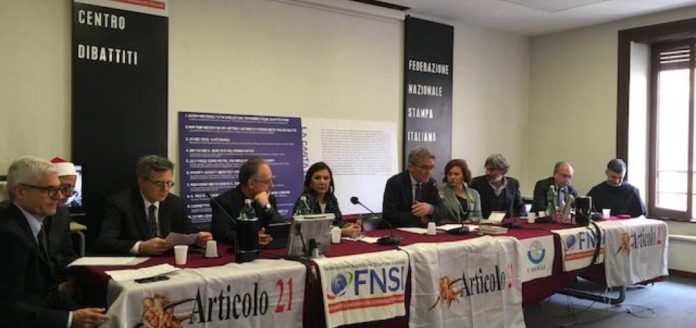Rome (NEV / Riforma.it), May 11, 2019 – “Society is not a tangle of threads, but a network made up of people: a community in which to identify oneself as brothers and sisters. Political, cultural and religious pluralism is a fundamental value. We connect people”, can be read at point nine of the Assisi Manifesto signed and presented in its final form on Friday May 3, in Rome, at the headquarters of the National Federation of the Italian Press (FNSI).
To sign and present the Manifesto (exactly on the International Day for Press Freedom) the imam of the Great Mosque of Rome, Saleh Ramadan Elsayed, the president of the Jewish Community of Rome, Ruth Dureghello, the prefect of the Communication Department of the Holy See, Paolo Ruffini, the director of Civiltà Cattolica, Father Antonio Spadaro, the director of the Press Room of the Basilica of San Francesco d’Assisi, Father Enzo Fortunato, the person responsible for communication, external relations and institutional relations of the Federation of Protestant Churches in Italy (FCEI), Gian Mario Gillio, the president of the FNSI, Giuseppe Giulietti, the spokesman of the Community of St. Egidio, Roberto Zuccolini, and Paola Spadari, president of the Latium Journalists Association. The works were introduced and coordinated by Roberto Natale. The document also contains a motion on the value of pluralism, presented in recent months by the moderator of the Waldensian board, pastor Eugenio Bernardini.
The Manifesto is not a “Charter of ethics for journalists, it is a declaration of universal brotherhood against the wall of hatred that calls into question all peacekeepers”, said the president of the FNSI Giuseppe Giulietti, greeting those present and continued, “It is the first international manifesto born from below against the media walls” because the words “if used incorrectly, can be stones”. Giulietti recalled the “thirty-year journey” which finally led to the realization and dissemination of the Manifesto. A path that, inevitably, had to follow the signs of the times and the events linked to the ecumenical and interreligious, political and social dialogue of the Country.
The Assisi manifesto is the fruit of a long journey that brought together different people: “It is a shared action plan, an appeal to everyone’s conscience – said Gian Mario Gillio at the meeting -. Today we have taken ourselves by hand to go forward together, to cross bridges and put ourselves as a garrison to avoid the building of new walls. The precise value of this Manifesto is that it doesn’t only address communication operators, but it addresses everyone, men and women, people of faith and non-believers, it relies on individual and collective responsibilities and invites all those who write, comment or do information on the media or on the web to an empathetic, polite and non-biased or propagandistic approach. To remind us that when we write about others, we should do it as we would like others to write about us”.





























